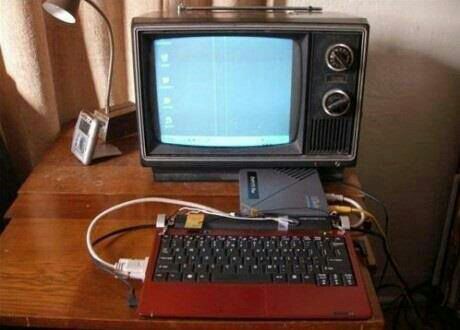Do you support public ownership of the means of production? Why or why not?
For the purpose of this thread, the means of production are essential services, essential utilities, and factories for essential goods. Also, public ownership doesn't necessarily imply state ownership; it could be collective ownership by individual citizens or workers.
To answer the question: I do, but the brand of socialism I support strongly opposes concentration of power in the hands of a one-party state. Instead, I believe public ownership of the means of production should belong to citizens and workers. Furthermore, I believe privately owned means of production should be allowed to exist parallel to publicly owned ones, albeit under sound regulation to reduce exploitation and undue influence of oligarchs.
I think the key thing to consider relates more to the matter of
how socialism can be implemented. If the ruling class sits on their thumbs and waits until things get so incredibly bad that revolution is the people's only recourse, then it's already too late. If people can be reasonable and flexible enough, who are willing to negotiate mutually beneficial agreements, then I believe power and ownership can be shared amicably.
Historically, I would suggest the reason that some socialist regimes have gotten out of control is because of the wanton greed, stubbornness, and intransigence of capitalists. Trying to appeal to the "better angels of our nature" (as Lincoln put it) doesn't always work as it should. We're talking about people who would rather fight a war and sacrifice 620,000 lives all because they couldn't bear the loss of profits which would have been incurred by abolishing slavery. The same bunch was equally stubborn and greedy throughout the labor movement, which they fought against tooth and nail (and killed a lot of innocents in the process).
Capitalists tend to exude a certain kind of arrogance, a kind of entitled intolerance of the lower classes, whom they see as little more than cattle and work animals. It's that part of "human nature" that socialists tried to change, and since that aspect only appears to be evident in the top 1-2% of the population, it seems a doable goal. When we speak of "human nature" overall, it refers to the concept of natural law - which can also be called "the law of the jungle," which human civilization has tried to move away from.
Still, if you ask the average capitalist why it's okay for them to have more wealth than they could possibly need, living in mansions and luxury, while so many countless millions are toiling in the fields, mines, and factories and living in squalor, the typical answer would relate to natural law in one form or another.
They would say that they're smarter, stronger, or superior to the peasants whom they deride and scorn as "lazy," "worthless," "shiftless," etc. The hierarchy between rich and poor is merely considered the natural state of being, "it's just the way things are" is a commonly heard saying. As demonstrated by a violent and bloody history, it appears that capitalists believe so deeply in this idea that they are willing to kill and die for it. They would quite literally rather die than face the prospect of having to eat at the same table as those ugly, inferior "peasants" whom they despise and scorn so much.
Even after the peasants and workers overthrew their government and turned the tables on the capitalists, the capitalists still stubbornly refused to listen to reason. They just couldn't imagine any other world where they couldn't own huge fortunes and exploit the workers with impunity. Even when the workers revolted and put a gun to their heads, they ostensibly chose to die rather than accept living in a society where they were expected to act like decent human beings. That was unthinkable to them. "If I can't go on accumulating massive wealth and abusing the peasants, then I would rather die." So, in some socialist revolutionary societies, such people ended up being killed or imprisoned. After so many millions had died in WW1 and the Civil War, socialists of that time and place were in no mood to give countenance to the kind of oppositional BS they had been facing all their lives. I'm not condoning what they did, although because I understand the extreme conditions they had been facing during that time, the best way to avoid it is to not let things get so far out of hand.
It was different for the Western liberal democracies, which had gotten a head start in the age of exploration, colonization, and imperialization of the world. It's really no coincidence that liberal and progressive ideals sprung up in France and Britain, being that they were also the most powerful countries of the time, with the largest empires.
Unlike their counterparts in other areas of Europe or the world, they ostensibly understood the necessity of keeping the lower classes contented within the homelands, while gaining wealth via the exploitation of other indigenous peoples throughout their empires. The U.S. took a somewhat similar path, although it still took some goading to end slavery and bring about a stronger labor movement. Support of labor unions and liberal social programs proved to be an effective hedge against the propagation of revolutionary socialist ideals. It was more effective in the long run than McCarthyism or any other "red scare" propaganda.
So, getting back to your original question, the reason why socialists believe it's better to have the workers control the means of production is because it is believed that that's the only effective guarantee that they'll be treated fairly and equitably. However, in many Western liberal democracies, the state offers certain guarantees which gives workers some leverage, along with the right to join labor unions and collective bargaining.
As long as the capitalists are willing to play ball and give some consideration to the lower classes, then the people can still be contented, even if they don't own or control the means of production. That's the Keynesian style of capitalism which was introduced under FDR and continued in the decades which followed. It worked rather well, and it brought about the period of greatest economic growth and improvements in the standard of living across the board. The workers were reasonably content, support for Civil Rights was growing by leaps and bounds, American industry was humming, along with great advancements in science, technology, education, healthcare, transportation - even culminating with sending a man to the Moon.
Whatever capitalists were doing back then, they were obviously doing it right, as exemplified by the obvious successes which were achieved. But whatever changes they advocated for and brought about under Reagan were obviously wrong, as exemplified by the obvious failures we've seen since then. I wouldn't necessarily blame "the capitalists" as such, as I think it was more a political ideological shift which took place for a variety of reasons, probably a backlash against those dang leftist hippies and civil rights advocates. It's from that cultural and ideological shift that took place that capitalism became more odious and regressive, and it's from that same culture that we saw the rise of Donald Trump. He and others like him are a natural consequence of that culture and ideology.
To me, the overall goal is a better society, a better standard of living for the people, a more fair and equitable system of justice and economic remuneration for one's labor. If capitalists are willing to go along with this, then there may not be any pressing reason to take away their ownership of the means of production. As long as they're willing to do right by the people, treating both their customers and workers with respect, honor, decency, and fairness, then a capitalist system could work. In other words, we have to be able to appeal to the "better angels of their nature."
Or as Rush once put it "And the men who hold high places, must be the ones who start, to mold a new reality, closer to the heart."
But if they're too stubborn and naively believe that they're entitled to own everything while leaving billions in this world out in the cold of poverty and squalor, then they might end up having to face someone like this:


